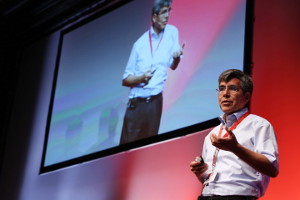Final Program
Final Program INTERACCION 2012 (PDF)
Keynote Speakers
Opening and closing plenary sessions for both Conferences (Interaccion 2012 and MexIHC 2012) will be broadcasted by videoconference.
Opening Plenary (Interacción 2012)
Wednesday, October 3, 2012 – 17:00
Salón de Actos (Quorum I Building)
HCI Research in the wild: Action and research – a happy marriage?
When conducting research in real life settings it is not uncommon that things do not turn out as planned or expected. But, that is not wrong, it is a natural part of all research conducted in and on practice. This talk will introduce a methodological framework for the study of practice called Action Research and discuss what effect an action research approach may have on the selection of research problems, on the selection of methods and subsequently on the progress of the entire research career. Action research brings together theory and practice in action and reflection with the purpose of dealing with real and actual practical problems in a collaborative fashion to achieve worthwhile purposes.
Jan Gulliksen
Royal Institute of Technology, Sweden

Short Bio
Jan Gulliksen is a Professor of Human Computer Interaction and Dean of the School of Computer Science and Communication at the Royal Institute of Technology – KTH in Stockholm, Sweden. He holds a M.Sc. in Engineering Physics and a PhD in Systems Analysis and was previously a Professor at Uppsala University. Jan has conducted a number of Action Research projects with Swedish public authorities with the purpose of introducing more user-centered design methodologies and was a founder of the NordiCHI conference series. He has been involved in writing ISO standards on Usability, Accessibility and Human-Centered Design and is the current Chair of IFIP TC 13, Human Computer Interaction. Jan has authored more than 100 publications and has been active as a consultant in industry.
Keynote Speaker (Interacción 2012)
Thursday, October 4, 2012 – 17:00
Salón de Actos (Quorum I Building)
Beyond an Application Domain: Web Engineering as a Research Perspective for Human-Computer Interaction
The World Wide Web (or simply the Web) started in 90’s as a simple hypertext-based user interface for supporting cross-platform information dissemination among specialized users at the CERN. Two decades later, the Web barely recalls us its early days. Currently the Web is commonplace, its user interface is highly interactive, and it supports a large range of applications, users and devices. Indeed, the growth of the Web had a significant impact on business, banking and finance, commerce and industry, education, government and entertainment sectors, as well as on our daily lives. One of the most interesting facets of the evolution of the Web is the increasing tool support for allowing users to accomplish their tasks. At first, users could only browse through contents provided by static Web sites. Nowadays, users can actively contribute with content by using tools (e.g. Content Management Systems and wikis) embedded into these sites. More recently, tools built under the concept of Web augmentations extend what users can do with Web content. For example, using visual Mashups, users can compose content hosted by different Web sites and they can define and run specialized scripts to change third part Web applications by adding content and/or controls. Based on illustrative Web applications we trace back the history, the evolution of Web technology and the underlying process that lead to the convergence of the development around the Web platform. Our aim is to discuss that beyond of being perceived as a particular application domain, the development of Web applications challenges the research on Human-Computer Interaction.
Marco Winckler
Université Paul Sabatier, France
Short Bio
Marco Winckler is assistant professor in Computer Sciences at Université Paul Sabatier (Toulouse, France) where he is involved in education at Undergraduate and Graduate levels. He obtained a PhD degree in Informatics (2004) from Université of Toulouse 1 Capitole (Toulouse, France) and a Master’s degree in Computer Science (1999) from the Universidade Federal do Rio Grande do Sul (Porto Alegre, Brazil). From 2006-2007 he was visiting scholar at the Université catholique de Louvain (Louvain-la-Neuve, Belgium). Marco Winckler is member of the Interactive Critical System (ICS) research team where he investigates models, methods, techniques and tools to support the development of reliable, usable and effective interactive systems. His research combines topics of Engineering Interactive Systems, Human-Computer Interaction and Web Engineering. He has been involved in many National and European projects in these fields and published more than 60 refereed scientific papers in journals, international conferences and books. Among his academic duties, he is responsible for the internship program of the Master Program on Human Computer Interaction (http://www.masterihm.fr) held by the Université Paul Sabatier and the Ecole Nationale d’Aviation Civil (ENAC). He also serves as vice-chair for the IFIP working group 13.2 on Methodologies for User-Centered Systems Design and expert member at the IFIP TC 13 on Human-Computer Interaction. Further information on the web site: http://www.irit.fr/~Marco.Winckler
Keynote Speaker (MexIHC 2012)
Thursday, October 4, 2012 – 17:45
Salón de Actos (Quorum I Building) – Videoconference from Mexico
Autonomous Cars for City Traffic
We have developed three autonomous cars capable of driving in city traffic. The cars carry laser sensors, videocameras, a GPS unit, and several embedded processors. The main computer analyzes the sensor data and provides the necesary control signals. I will describe the hardware and software architecture in my talk and will show videos of the car in action. The car has been tested in 40Km stretches combining highway and streets in Berlin.
Raul Rojas
Freie Universität Berlin, Germany
Short Bio
Department of Mathematics and Computer Science PhD (summa cum laude) at the Otto Suhr Institute, Free University of Berlin (PhD in Economics and Social Sciences). Master of Economics at the Department of Economics, National Autonomous University of Mexico (UNAM). Master of Science (Mathematics) at the Department of Mathematics, National Polytechnic Institute, Mexico.
Clossing Plenary (MexIHC 2012) (broadcasted)
Friday, October 5, 2012 – 17:00
Salón de Actos (Quorum I Building) – Videoconference from Mexico
Human-centered computing: empowering users in complex informational domains
In modern society, whether making life-altering decisions or carrying out everyday tasks, people use online information, engaging in complex informational activities that place high demands on them and the computational systems that they use. Since this is partly due to the deluge of data that users must handle, significant research has been directed at devising automatic mechanisms that can handle large amounts of data. Interestingly, while systems and algorithms continue to improve, people increasingly need to engage with online documents more actively, purposely, and intensively than ever before. The challenge is not just to enable people to handle more data, but empowering them to use this continuously increasing amount of data, performing increasingly more complex informational tasks. This is particularly evident in complex and information-rich domains such as computational journalism, cultural heritage institutions, and assistive technology. In this talk, I discuss how research on human-centered computing is providing answers to the challenge of supporting (and taking advantage of) intense user engagement in complex information-rich domains by combining human insight with machine computation.
Luis Francisco Revilla
University of Texas at Austin, USA
Short Bio
Luis Francisco-Revilla is an assistant professor in the School of Information at The University of Texas at Austin. For over a decade, he has been conducting research on the area of human-centered computing, investigating how to augment the ability of people to use information actively, purposely and intensively. His research agenda is multifaceted and interdisciplinary, as it bridges social, informational, and computational aspects. As a result, Dr. Francisco-Revilla’s research interests expands and integrates work from several research areas including human-computer interaction, digital libraries, hypertext, computer supported cooperative work, information retrieval, and recommender systems. Dr. Francisco-Revilla’s recent projects include work in the domains of computational journalism, cultural heritage institutions, and advanced interfaces and interactions. He is primary investigator in the international collaborative grants Breadcrumbs, REACTION, and ImTV. He is also a Co-PI in the IMLS funded project CDLF. Dr. Francisco-Revilla has published extensively in the top venues in his field including: International Journal on Digital Libraries and ACM /IEEE Joint Conference on Digital Libraries (JCDL).


